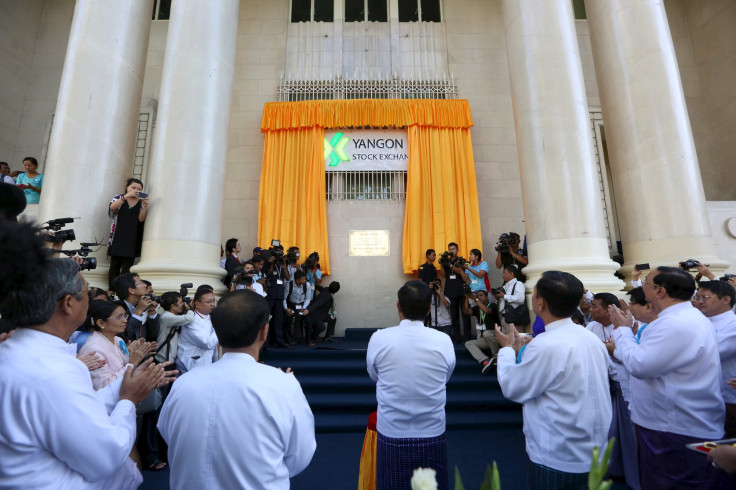Myanmar Stock Exchange Opens, With No Trading, To Speed Up Market Development

Myanmar's new stock exchange came into existence Wednesday, but there are no listed companies or brokers and therefore no trading as well. When trading begins, foreigners won't be allowed to participate. Proponents say it's nevertheless important to start, to accelerate economic change alongside the country's expected shift to a democratic government next year. In another sign of change, the U.S. on Monday lifted for six months its ban on U.S. companies using Myanmar's ports.
State-owned Myanmar Economic Bank, Japan's Daiwa Securities and Japan Exchange Group, operator of the Tokyo Stock Exchange, put up $24 million to form Yangon Stock Exchange, CNBC reported. There are no rules yet on company disclosures, shareholder votes and annual meetings. The 10 brokerages with conditional licenses aren't ready to operate, Reuters reported. These don't faze the government's stock exchange point man.
"It doesn't necessarily mean that at the opening day, trading must start," said Deputy Finance Minister Maung Maung Thein, according to Reuters. "This is the right time. If we do not start now, it will be too late."
Six companies are in line to list in Myanmar, but after opening in recent years, exchanges in Laos and Cambodia each have less than five listed companies, Reuters reported.
"The economic potential is different," Maung Maung Thein said. "We don't compare."
Myanmar has a $65 billion economy compared with Cambodia's $17 billion and Laos' $12 billion, according to the Association of Southeast Asian Nations data.
The U.S. ban on dealing with the port operator has put American companies at a disadvantage compared with Japanese and European competitors in entering one of Asia's last large frontier economies, the Wall Street Journal reported. Because of alleged ties with the military junta, the port operator is on a U.S. government blacklist and companies that deal with it face sanctions. Fearing sanctions, Citigroup Inc., Bank of America Corp. and other banks have avoided offering trade financing to companies since discovering the port operator is blacklisted, Reuters reported.
Trade financing assures a U.S. company that it will get paid once its shipment reaches Myanmar. According to the Journal, minus trade financing, U.S. exports to Myanmar have dropped and U.S. companies operating in Myanmar -- which include Gap, General Electric Co. and Coca-Cola Co. -- have been asking the U.S. government to address this for months.
“We were concerned that U.S. banks out of fear of sanctions risk, out of increasing compliance costs and burdens, would decide to pull out of the market entirely if we didn’t move forwards with a holistic solution that would clarify the operating picture,” a senior U.S. government official told the Journal.
The opening of the stock exchange and the temporary lifting of the sanctions on dealing with the port operator come a month after Aung San Suu Kyi's National League for Democracy swept parliamentary elections. She has since met President Thein Sein and military commander Min Aung Hlaing, who assured her that they will turn over power in March. The assurance is important because after she won the 1990 elections, the military refused to step down, instead putting her under house arrest for most of the next 20 years.
Back at the stock exchange, Serge Pun, head of First Myanmar Investment Co., one of the companies that have applied for listing, is raring to be the first.
"We are ready," he told Bloomberg.
© Copyright IBTimes 2024. All rights reserved.





















